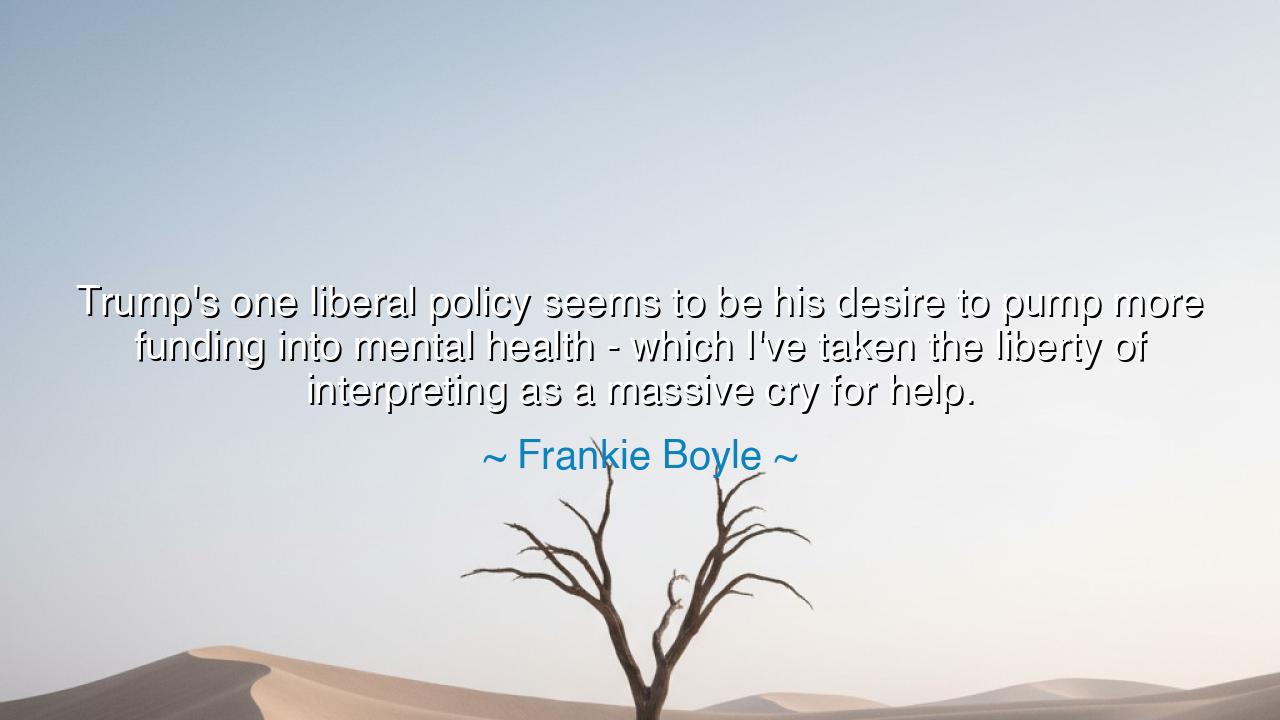
Trump's one liberal policy seems to be his desire to pump more
Trump's one liberal policy seems to be his desire to pump more funding into mental health - which I've taken the liberty of interpreting as a massive cry for help.






Hearken, O children of future generations, and attend to the words of Frankie Boyle, who cast his gaze upon the tumult of power and politics with both wit and insight: “Trump's one liberal policy seems to be his desire to pump more funding into mental health - which I've taken the liberty of interpreting as a massive cry for help.” In these words lies a mirror of human frailty, the paradox of strength and vulnerability entwined in those who wield power, and the eternal call to recognize that even the mighty may cry out for understanding.
The first meaning is clear: mental health is a matter of great importance, even in the chambers of power where authority and influence often cloak human vulnerability. Boyle’s observation highlights that within those who appear strong, decisive, or unyielding may reside unspoken struggles, hidden pains, or silent pleas for care. This insight is as old as the epics themselves: kings and warriors, admired for courage, often bore burdens of the mind unknown to their followers, their suffering masked by armor, speech, and ceremonial pomp.
Consider the story of King Nebuchadnezzar of ancient Babylon, who, according to the sages, was cast into madness, roaming like a beast upon the earth. Though he had once ruled with power unmatched, his mind faltered, reminding all that mental fragility can touch the highest and the strongest. Boyle’s remark, though delivered with sharp humor, echoes this eternal truth: the cries of the mind may manifest in unexpected ways, even in the halls of governance.
Moreover, there is a lesson in interpretation. Frankie Boyle, with wit as keen as a blade, interprets a policy as a “massive cry for help.” Here lies the wisdom of perspective: what seems an abstract policy or act of governance may reveal deeper truths about human need and vulnerability. To recognize this is to see beyond the surface, to understand the complex interplay between power, responsibility, and personal struggle. It is the skill of the observer, the sage who reads between lines, who discerns meaning where others perceive only action.
History is replete with leaders whose acts were both pragmatic and personal. Abraham Lincoln, beset by melancholy even as he steered a nation through civil war, sought solace in reflection, counsel, and empathy. His attention to human suffering, both personal and national, became part of his legacy. In this, we see that the recognition of mental health is not mere policy—it is acknowledgment of the human condition itself, a bridge between governance and humanity.
The lesson to be drawn is profound: attend to the mind, both in yourself and in others, even when cloaked in power or authority. Humor, policy, and interpretation may reveal hidden truths about the struggles that dwell within. By acknowledging vulnerability, by fostering understanding and care, societies can transform strength from mere force into compassion, wisdom, and enduring resilience.
Practical action flows from this insight. Advocate for mental health awareness, support programs that address the needs of the mind, and cultivate empathy for those whose burdens may not be visible. Listen attentively to cries, subtle or overt, and offer guidance, care, or simply understanding. Recognize that even the most seemingly formidable among us require support, reflection, and healing.
Finally, remember that human greatness is measured not solely by conquest, wealth, or command, but by the wisdom to acknowledge fragility and the courage to act upon it. Boyle’s words, though delivered in satire, are a clarion call: see the hidden truths, honor the unspoken needs, and let compassion guide your deeds. In doing so, the world is made not only stronger but profoundly more humane.
If you wish, I can also craft a spoken-word version of this passage, with natural rises and falls, emphasizing the emotional and heroic undertones for narration.






AAdministratorAdministrator
Welcome, honored guests. Please leave a comment, we will respond soon